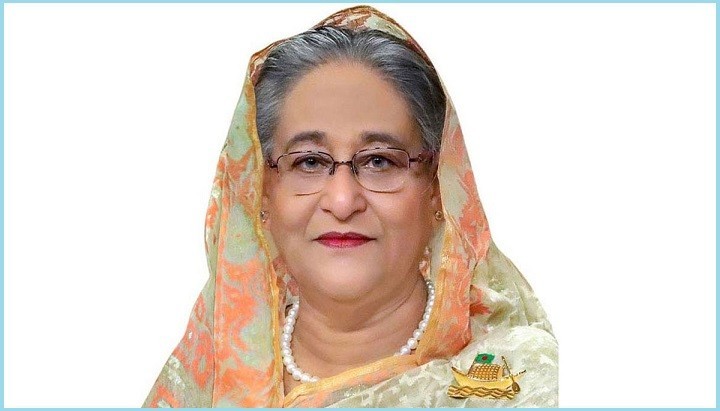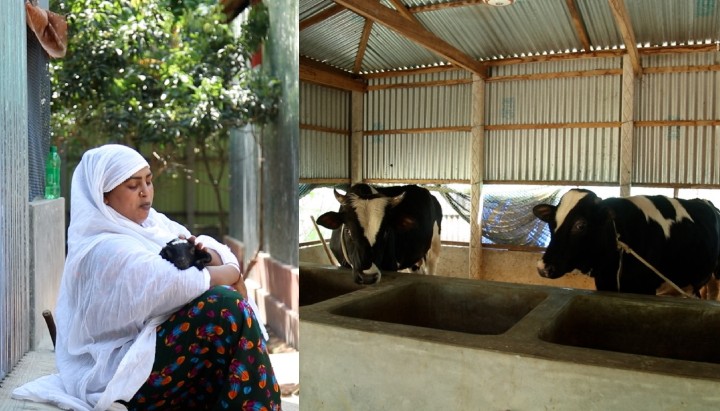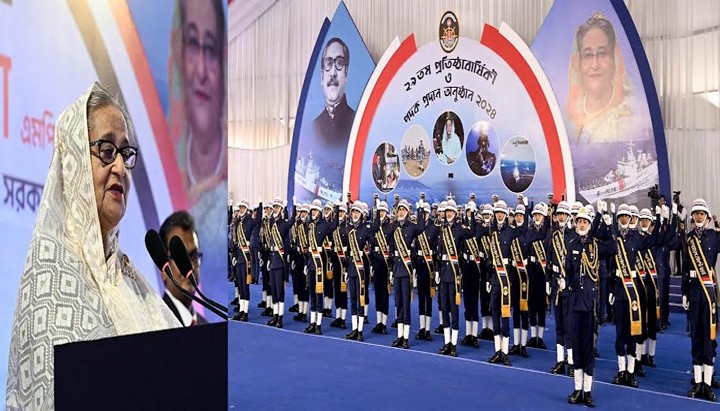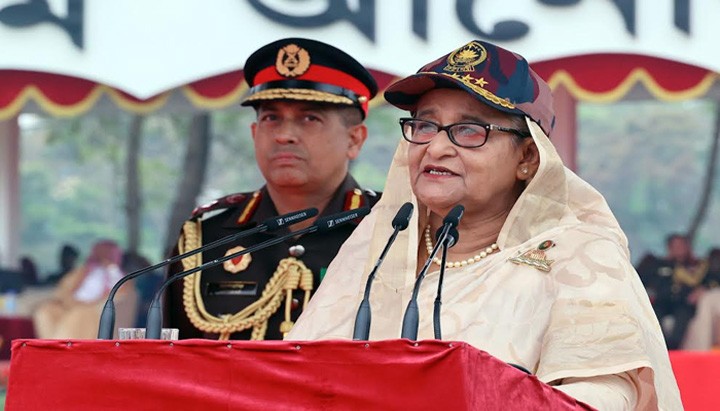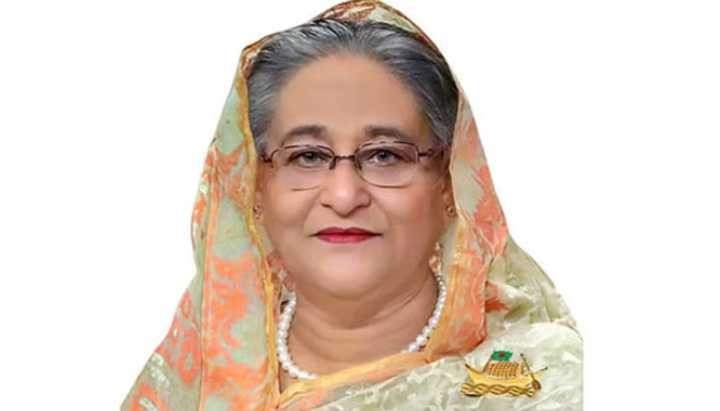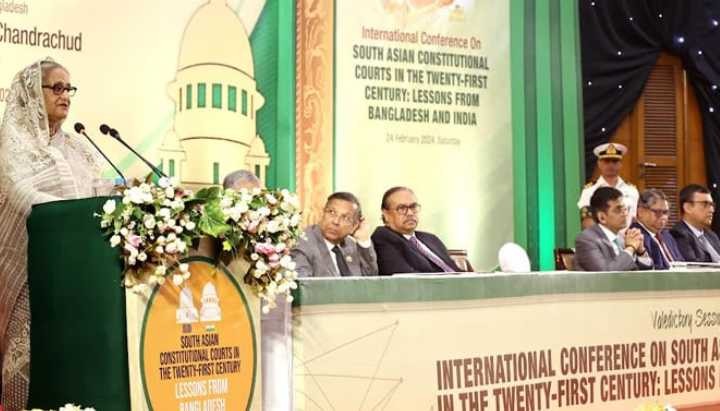Khairun is a member of the third gender community. However, unlike many others, she doesn't wander the streets or engage in indecent behavior, nor does she beg for money. Instead, she spends her time cutting grass when needed and giving time to children. She prioritizes taking care of her family members, which consumes most of her time amidst her busy schedule. Her dreams revolve around her entire family, and she's steadily advancing towards fulfilling those dreams. And the Livestock and Dairy Development Project (LDDP) of the Department of Livestock has been a companion in fulfilling that dream.
I am talking about Khairun Hijra from Kandapara village in the Kalia Haripur Union of Sirajganj Sadar, who is identified as a member of the third gender community. However, Khairun's notable identity now lies in being a full-time farmer and an active member of the livestock and dairy development project's PG Group. Her identification number is 68878-SC-03-11. Initially, Khairun embarked on her journey with 20 high-quality breed chickens, but presently, her farm accommodates 5 cows, 8 goats, and several chickens. Additionally, one of her goats gave birth two months adairy
Khairun Hijra started with 20 chickens but faced difficulties due to an unknown disease that killed a few chickens. She contacted the Upazila Livestock Office for advice. They suggested selling the remaining chickens and investing in goats or other livestock. Following their advice, she sold the chickens for nearly 10,000 taka and bought two goats at 5,000 taka each. However, her luck turned as now she has 8 goats in her farm. Similarly, starting with a cow, she now has 5 cows, allowing her to sell 7 to 9 liters of cow milk daily.
Khairun Hijra told Bangla Insider that, "I have received training at the Upazila Livestock Office. Then they gave me 20 chickens. However, I couldn't benefit much from them. So, I sold the chickens and bought goats instead. Later, I bought a cow. Now I have 5 cows, 8 goats, and quite a few chickens on my farm.
When asked about her plan regarding this farm, she said, "Everyone dreams of being successful. I also dream that one day I will become a successful farmer. For that, I need investment here, which is difficult and extremely challenging for me. Because of being a transgender, no one wants to lend us money. Especially, getting institutional loans is difficult for us. So if the government arranges interest-free loans for us, then I and thousands of other transgenders like me can progress further. They can be self reliant. They won't have to beg. Besides, my request to the government is to consider providing goats or cows instead of chickens, which would be more beneficial.
It is to known that the Department of Livestock has formed Producer Groups (PGs) nationwide for small-scale farmers. The purpose is to organize these farmers through these PGs and provide various forms of assistance, especially training, technology, etc., and to achieve the desired development in the livestock sector through enhancing their capabilities. Throughout the country, there are a total of 6,500 PGs. Each group consists of approximately 20 to 40 members. Among the total 6,500 PGs, this one in Sirajganj is one and the only third-gender PG.
In the PG group, there is not only Khairun Hijra, but also 14 other members, making a total of 15 members in the PG group. Among them are Sohagi Hijra (68878-SC-03-12), Md Sabuj alias Shankhini (68878-SC-03-13), Shetu Hijra (68878-SC-03-15) and some others. All of them are active members of the PG Group.
Sirajganj District Hijra (Third Gender) Association President Md. Omar Farooq Rabbi told Bangla Insider that we are working with a 15-member PG team consisting of transgenders and hijras formed by upazila livestock. Upazila Livestock Department is giving us a lot of support. We receive different types of training, learned about the relationship between cattle and gender diversity, what are the duties and responsibilities of a PG team, duties and responsibilities of a team president, cashier and PG team policies.
He further stated, "We each save 100 taka per member every month. We have an account for our PG team at Rajshahi Krishi Unnayan Bank. Initially, we received 20 chickens from the upazila. We take care of them and try to advance. We request the Livestock Department from our PG team to provide us with cows and goats so that we can become more self-reliant. So that, we won't have to rely on others anymore. We want to earn our living through our own work. We don't want to depend on anyone's charity. We have formed a team to show that the hijras want to work and earn their living like the mainstream society. If we receive cooperation from society, we too can lead a normal life.
Sirajganj Upazila Livestock Officer Dr. Md. Alamgir Hossain said, when we go to the railway stations or markets, we often see transgendes begging from others and the LDDP project had an opportunity to bring the backward communities into the mainstream. Dr. Nazrul Islam Jhantu Sir, the then regional director of Rajshahi first had this idea that if we can form a team with them, then they will be self reliant and they will no longer have to beg for money. They can be an equal part of the mainstream society. Based on this idea, we proposed it to the Department of Livestock. The authority accepted it. Then we provided them with training and initially gave them 20 chickens. Alongside, we provided chicken feed and utensils. From there, they are now in a good position.
Mentioning this hijra PG group of Sirajganj as an example, the upazila livestock officer said, We are proceeding with how to work with hijra on a larger scale. There are 2 thousand five hijras in Sirajganj district. We have plans to expand this group further. Now we give them only chicken in the beginning. But we have plans to give them cows or goats in the near future. If we can work with them on a larger scale, there will be a revolution in society.


